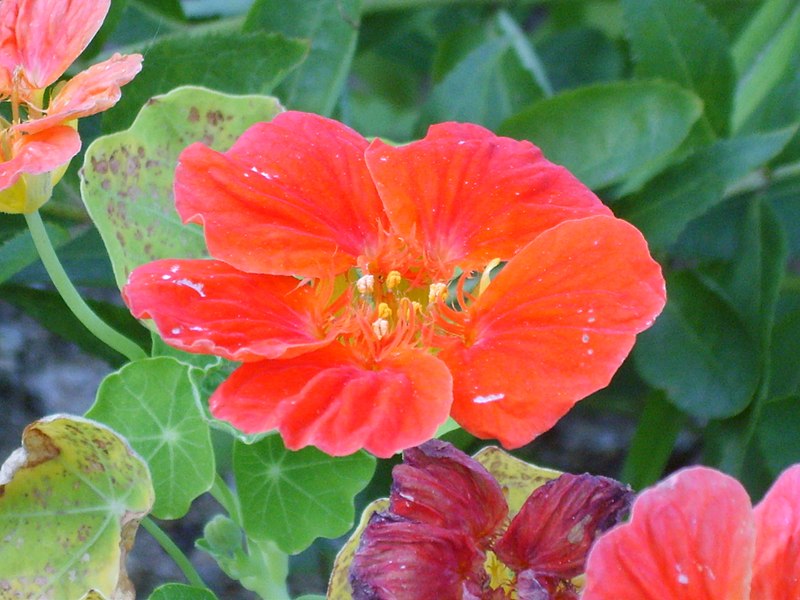
The plum-lacquered woven Japanese basket Phil
Lately back from Kyoto gave us,
Juliet’s baby bed on Nymph and Cherry,
The year Phil dwelt over on Larch with Don A.
Beyond the shimmering silver dollar eucalypti,
Still packed away in the basement to this day.
Sometimes strolled two dirt road blocks to visit.
People mad at him if he came over, or if he didn’t,
He averred. Even in paradise poverty is a bother.
Tones if not words are always recollected.
Portly Bodhidharma mendicant
Toting his laundry downtown, two sad sacks.
Later on he camped down on Terrace tender
Dear heart crotchety and all alone as a song
In the same town with his vivacious Muse,
The elusive butterfly diva, Joanne K.,
Not quite on the outs and not quite on the ins with her,
Impatient amid nasturtiums as the day was long.
Time fills in the holes, cement in the ocean,
Dark parts of memory shading into bright.
One day when on acid the eucalyptus tilted,
A circus of silliness shimmering into play,
Phil sternly informed me, Thomas Clark,
Poetry will never get written this way.


i.m. Philip Whalen 1923-2002

Eucalyptus tree with sun shining through its branches: photo by DO'Neil, 2005
Leaf and flower bud cluster of Australian Eucalyptus angophoroides: photo by Benjamint444, 2008
Eucalyptus sideroxylon, leaves, stems, petioles, branches, buds & capsules: photo by HelloMojo, 2007
Tropaeolum majus: photo by Dalgial, 2008



9 comments:
The nasturtium appropriately has that hallucinogenic hyper-rosy glow.
look something like soap
pose
possibility
disposability
pavonine possession
and its pregnant illity
ir-utility
Excellent, Tom: I well remember the scent and light of the Bolinas days... and then Phil, one of the last times I saw him in SF, though then purportedly completely blind, being able to cross to the shelves and put his hand precisely on the book he was talking about. One of the very few poets whose work has never failed me. Thanks. T
Annie, Lanny, Tom,
Thanks for the lovely responses.
Yes Annie the nasturtiums radiate a hyper-real beauty that is hallucinogenic without the drug, the distortion or the hangover (a curious lack of nostalgia now for those latter things). The neighborhood of the poem (Bolinas mesa, hard by Duxbury Reef) was thick with them, majestically overlorded by the grand shimmering eucalypti.
Looking back through Phil's poems of the period, I found this representative piece from August 8, 1971:
The Turn
Walking along Elm Road
Handful of nasturtiums, butter, some kind of bread
75c the loaf no advertising included
Bread and air and a price tag wrapped in plastic
The dogs come out as usual to roar at me
I find myself screeching wildly in reply
Fed up with suppressing my rage and fear
I bellow and roar
The dogs are scared and their people scandalized
"What are you trying to do? HAY! What are you trying to do?"
I had nothing to tell them; I was talking to their dogs.
Phil was composing poems as a regular daily practice in that epoch. It was his chosen line of work, and getting him to produce did not take much prompting. In a poem called "October First" (actually dated Nov. 30--Dec. 16, 1971) he wrote:
Find twenty beautiful pages for Thomas Clark
("Anything!" Joanne Kyger said. "I'd write anything I could!")
The twenty beautiful pages (for an anthology called "All Stars") came as promised.
Those were interesting times. The texts that remain reflect odd bits of memory, like shards of colored glass. A Phil poem called "The Letter to Thomas Clark 22: VII: 71 from Bolinas where He sat beside Me to Help to Write It" begins with the now inexplicable salutation: "Tom Clark/Waco,Texas" and is signed "Yours truly, Dad." God only knows what it all meant or means--and does it matter?
Lanny's word "possibility" about sums it up.
Ace poem, Tom.
Gracias, Bill.
Great to see this, Tom. The last time I saw Phil was at the Zen joint in SF. I arrived the exact moment of a UPS delivery man. I expected someone else to answer the door. But up walked Phil in an apron complaining that he was in the midst of cooking lunch. I announced myself and the delivery man. Phil signed for the package and explained he was busy. I felt like I had crossed the line of etiquette for my unannounced visit. But it was always fun to see him, and as you know, his work has always meant a lot to me.
Philip Whalen looked a good deal like my real Father, John Calef, whom I did not meet until I was 20.
Whalen seemed to be mostly a loner, though the novels suggest relationships of various kinds. His last years were difficult, despite having a well-defined place (and identity) in the Zen community. Perhaps the years in Kyoto were the best for him.
His writing gave/gives me endless pleasure and amusement. I always think of him riding the old yellow F Train up Shattuck Avenue circa 1952, having just fallen in love and grooving on the neon and his exuberant delight in being alive.
Curtis,
A lovely almost-memory. How strange and almost-impossible it is to think of Philip as a Dad.
I guess maybe loner and writer go together like, as they used to say in the song, love and marriage.
Ah, what a lovely dream-made-real 'twould be, were that old yellow F train to return... a thought I had 'tother night while slowly laboring up the steps over that toxic tunnel. Climbing toward Indian Rock on Midsummer Night.
Best,
Tom
Post a Comment